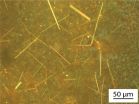(Press-News.org) About a quarter of all atrial fibrillation (AF) patients at the lowest risk for stroke receive unnecessary blood thinners from cardiology specialists, according to UCSF researchers, and these providers must be made aware of the resulting potential health risks.
Their research letter appears online and will be in the June 1 issue of JAMA Internal Medicine.
"The irony is that there is a general push to get providers to prescribe these drugs, and they are also generally under-prescribed among many AF patients who actually need them," said senior author Gregory Marcus, MD, MAS, director of clinical research in the UCSF Division of Cardiology. "Our study suggests people are trying to do the right thing but, due to a lack of understanding of some of the critical nuances, go too far in that direction in low-risk patients."
In AF, electrical impulses are triggered from many areas in and around the upper chambers (atria) of the heart instead of just one area. This activity is chaotic, and the atrial walls quiver rather than contract normally in moving blood to the lower chambers (ventricles).
For atrial fibrillation patients at risk for thromboembolism, anticoagulation therapies with warfarin or other drugs reduce morbidity and mortality. But because their use carries a bleeding risk, they are not recommended for AF patients at a particularly low risk for stroke.
In fact, current guidelines do not recommend oral anticoagulation in patients under age 60 without heart disease or other known risk factors for thromboembolism or in AF patients without any established risk factor for stroke. The previous guidelines, which were in place at the time the data for this study were collected, had, in fact, a very strong recommendation specifically to avoid anticoagulants in that population.
Marcus and his colleagues examined the prevalence of non-guideline adhering oral anticoagulant prescription in young and healthy patients at the lowest risk for thromboembolism by reviewing nearly 11,000 patients nationwide age 60 and under from the overall Practice Innovation and Clinical Excellence (PINNACLE) Registry® of the National Cardiovascular Data Registry between 2008-2012. The PINNACLE Registry was created in 2008 by the American College of Cardiology as the first national, prospective, office-based cardiac quality improvement registry in the United States and enrolled more than 1.7 million patients.
Surprisingly, about 25 percent of patients (2,561) were prescribed oral anticoagulant therapy contrary to contemporary guideline recommendations. Further, the researchers found males with AF at the lowest risk of stroke were more likely to be prescribed oral anticoagulation than females, as were older patients and overweight patients without stroke risk factors.
As a result, providers may not be fully aware of the potential risks of these drugs or the particularly low risk of stroke in certain populations.
"Practitioners who prescribe blood thinners need to be diligent about weighing the risks and benefits of these medications," said lead author Jonathan C. Hsu, MD, MAS, of the UC San Diego Division of Cardiology and recent UCSF cardiology and electrophysiology graduate. "In those patients with no risk factors for stroke, the risk of bleeding likely outweighs the benefit of stroke reduction. The fact that blood thinners were prescribed to so many patients with no risk factors for stroke is a wake up call that we need to do better for our patients."
INFORMATION:
Other contributors to the JAMA Internal Medicine research letter were Paul S. Chan, MD, MSc, and Fengming Tang, MS, of the Saint Luke Mid America Heart Institute and the University of Missouri, Kansas City; and Thomas M. Maddox, MD, MSc, of the Veterans Affairs Eastern Colorado Health Care System/University of Colorado School of Medicine. Funding was provided by the National Heart Lung and Blood Institute and the U.S. Department of Veterans Affairs.
UCSF is the nation's leading university exclusively focused on health. Now celebrating the 150th anniversary of its founding as a medical college, UCSF is dedicated to transforming health worldwide through advanced biomedical research, graduate-level education in the life sciences and health professions, and excellence in patient care. It includes top-ranked graduate schools of dentistry, medicine, nursing and pharmacy; a graduate division with world-renowned programs in the biological sciences, a preeminent biomedical research enterprise and top-tier hospitals, UCSF Medical Center and UCSF Benioff Children's Hospitals. Please visit http://www.ucsf.edu.
MADISON, Wis. - Take a material that is a focus of interest in the quest for advanced solar cells. Discover a "freshman chemistry level" technique for growing that material into high-efficiency, ultra-small lasers. The result, disclosed today [Monday, April 13] in Nature Materials, is a shortcut to lasers that are extremely efficient and able to create many colors of light.
That makes these tiny lasers suitable for miniature optoelectronics, computers and sensors.
"We are working with a class of fascinating materials called organic-inorganic hybrid perovskites that ...
Neonatal abstinence syndrome (NAS), a drug withdrawal syndrome in infants following birth, has historically been associated with illicit drug use among pregnant women.
But a study by a team at Vanderbilt University Medical Center shows that pregnant women are commonly being prescribed opioids -- narcotic pain relievers such as hydrocodone -- which results in an increased likelihood of NAS. In addition, the study found that opioid type and duration of exposure combined with tobacco use or selective serotonin reuptake inhibitor use (for treating depression and anxiety) ...
ARGONNE, Ill. - Scientists have developed a new approach that combines ptychographic X-ray imaging and fluorescence microscopy to study the important role trace elements play in biological functions on hydrated cells.
A team of researchers using the Advanced Photon Source, a U.S. Department of Energy Office of Science User Facility at Argonne National Laboratory, demonstrated unparalleled sensitivity for measuring the distribution of trace elements in thicker specimens at cryogenic temperatures, in this case at about 260 degrees below Fahrenheit.
Trace metals are important ...
JACKSONVILLE, Fla. -- When people find out -- usually from a diagnostic scan looking at something else -- that they have a lesion in their pancreas that could morph into pancreatic cancer, they can panic. They insist on having frequent CT scans and biopsies to monitor the lesion, or they ask for surgery. Physicians also don't know if these abnormalities are dangerous, so the patients end up in surgery having part of their pancreas removed. Often the lesion is nothing to worry about.
But a team of international physicians, led by researchers at Mayo Clinic's campus in ...
Scientists from the Growth Factors, Nutrients and Cancer Group at the Spanish National Cancer Research Center (CNIO), led by Nabil Djouder, have discovered that the MCRS1 protein, in response to an excess of nutrients, induces an increase in the activity of mTOR (the mammalian/mechanistic Target of Rapamycin); a protein that is altered in human diseases such as cancer and diabetes, processes associated with ageing, as well as in certain cardiovascular and neurodegenerative pathologies. The finding, published in the journal Developmental Cell, opens up new possibilities ...
(Washington, D.C.) - According to financial planners, women face unique challenges when preparing to retire. A recent study co-authored by Robin Lumsdaine, Crown Prince of Bahrain Professor of International Finance at American University's Kogod School of Business, reveals retirement-age women who have new grandchildren are 9 percent more likely to retire early than those who do not. The increased probability of early retirement due to the arrival of grandchildren is comparable to the number of women that retire due to worsening health. The decision to retire early has ...
(WASHINGTON - April 13, 2015) - New research published online today in Blood, the Journal of the American Society of Hematology (ASH), reports that children with "bubble boy disease" who undergo gene therapy have fewer infections and hospitalizations than those receiving stem cells from a partially matched donor. The research is the first to compare outcomes among children with the rare immune disorder - also known as X-linked severe combined immunodeficiency (SCID-X1) - receiving the two therapeutic approaches.
Children with SCID-X1 are born with a genetic defect that ...
WASHINGTON, April 13, 2015 -- Ever run out of your go-to cleaning product, and you've got a mess that you just can't leave alone? Have no fear, chemistry is here. Reactions is back with another round of our Chemistry Life Hacks series, and this week it's all about cleaning. Learn how to make your own glass cleaner, keep red wine from staining your carpet and why spit, yes spit, can also be a great cleaning product. Check out the video here: https://youtu.be/IpG3VClxO3c.
INFORMATION:Subscribe to the series at http://bit.ly/ACSReactions, and follow us on Twitter @ACSreactions ...
The recent increase in popularity of marijuana use coupled with more liberal state-level polices has begun to change the landscape of adolescent marijuana use. More potent forms of marijuana, such as hashish, may present a threat to adolescent health. A wealth of research has been conducted to examine risk factors for teen marijuana use; however, studies rarely differentiate between different forms of marijuana.
A new study by researchers affiliated with New York University's Center for Drug Use and HIV Research (CDUHR), was among the first to examine prevalence and correlates ...
Air pollution and smog have health consequences for affected populations ranging from respiratory problems to death. Fine particulate matter especially has become the focus in recent years, because it increases the probability of dying from respiratory or cardiovascular disease. In addition, the risk of stroke is increased, as shown by Barbara Hoffmann and her coauthors in a recent study in Deutsches Ärzteblatt International (Dtsch Arztebl Int 2015; 112: 195-201). In a population of the German Ruhr region, she investigated how often stroke and cardiovascular disease ...


